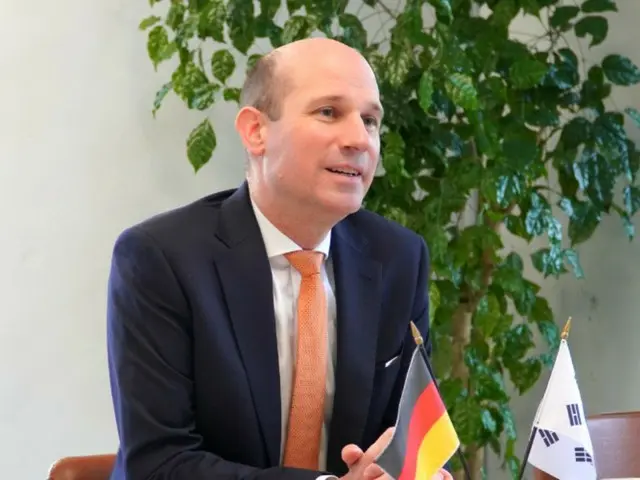"Because of this bill, foreign CEOs are wondering whether they should take on representative roles in Korea."
Martin was born on the 28th of last month in Hyoja, Jongno-gu, Seoul.
In an interview with the Herald Business Daily at the Korean-German Chamber of Commerce in Seoul, he expressed concern that the Serious Disaster Punishment Act is making the Korean market less attractive.
"It's unacceptable that a CEO should go to prison simply for being the CEO of a company, even if he or she did not do anything with bad intent," Martin said.
"These are extremely extreme regulations," he said. "Of course, companies must compensate workers for damages. If a company acts negligently and erroneously, it will be held civilly liable.
"It is common for companies to impose penalties on their CEOs. But going further and imposing criminal sanctions is going too far," Martin said.
"There is also an atmosphere of dislike for Korean employees to be posted to Korean corporations," he said. Martin, who is also a German lawyer, also criticized the reality of Korean politics, where the application of the law frequently changes depending on the administration.
"Every time a new government comes to power, the same laws are applied differently, causing confusion for German companies," Martin said.
In fact, according to a recent survey on the Korean business environment for German companies conducted by the Korean-German Chamber of Commerce, German companies
Of the 100, 38% answered "dissatisfied" and 13% answered "very dissatisfied." Fifty-one percent were dissatisfied with domestic laws and systems. Only 6% were "satisfied" or "very satisfied."
"The bill is unclear and companies are confused about how to interpret it and apply it in practice, which is difficult for them," Martin said.
"It would be very appreciated if more specific explanations could be provided," Martin added.
Following the 40th anniversary of the Korea-Germany Chamber of Commerce that year, a series of large-scale events were held to commemorate the 140th anniversary of Korea-Germany diplomatic relations last year.
The two countries have grown rapidly and become more important partners to each other. Last year, trade between Korea and Germany reached a record high of $33.9 billion.
Germany's share of trade with Germany is about 22% of the total trade between the two countries. Martin noted that both countries have strengths in manufacturing and technology, and stressed that the two countries are not only competitive but also cooperative.
Martin said, "Korea is Germany's third-largest trading partner in Asia. As both countries are trade-oriented nations, it is important to bring economic and related regulations closer to global standards.
"If we can improve the FTA to reflect the current situation, we will be able to do more cooperation," Martin said.
The two sides have continued to advocate "TA2.0." As the agreement has been in place for 14 years, it is necessary to reflect the changes in the international environment. Through this, the two countries can maximize mutual benefits and
He emphasized the need to develop technology and business for a sustainable future. Currently, South Korea and Germany are cooperating on themes such as decarbonization in the industrial sector and the use of renewable energy. "
The Korea-German Chamber of Commerce and Industry, which also acts as the domestic official secretariat for the Korea-German Energy Partnership, will also hold conferences and seminars on a variety of themes this year, including reducing industrial carbon emissions.
I plan to. In addition to energy, Mr. Martin will work in the field of e-mobility (electric cars, electric trucks, electric buses, electric motorcycles, etc.) based on the automotive industries in which both countries have strengths.
I hope that cooperation will be possible. In fact, according to the ``Survey of Korean Business Environment among European Companies'' recently conducted by the Korea-German Chamber of Commerce and Industry, German companies have a high level of interest in the Korean market.
It shows. Among the German companies that responded to the survey, 55% said that the Korean market is becoming increasingly important. This is a significant increase compared to last year's 27%.
Recently, in response to the opinion that European companies have been somewhat marginalized amidst the active mergers and alliances among global companies in the semiconductor industry, he replied, ``Even in the EU, including Germany,
"Germany does not have a large semiconductor company like Samsung or SK Hynix, but it has a large number of gas and optical companies," Martin said.
"Germany is also very interested in dealing with risks to the semiconductor supply chain, and we are working to strengthen the capabilities of the semiconductor manufacturing industry," he said.
The media interview was held on the same day at the Blue House, where the Korean-German Chamber of Commerce and Industry (KCCI) is based.
This was the first time since the Korean-German Chamber of Commerce moved to Jongno, where it can see the former presidential office and Gyeongbokgung Palace. To commemorate the expansion and relocation of the Korean-German Chamber of Commerce office, a delegation including high-ranking officials from the German federal government will visit Korea in the first half of this year.
"With this relocation, we will be able to more effectively support German companies in entering the Korean market," Martin said.
2024/04/04 06:48 KST
Copyrights(C) Herald wowkorea.jp 104

